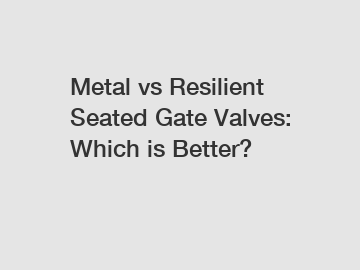Disai supply professional and honest service.
Metal vs Resilient Seated Gate Valves: Which is Better?
Gate valves are essential components in various piping systems, used to control the flow of liquids or gases. When it comes to selecting the right gate valve for your application, one of the key decisions to make is whether to choose a metal gate valve or a resilient seated gate valve. Both types have their own advantages and limitations, and understanding the differences between them can help you make an informed decision. In this article, we will compare metal and resilient seated gate valves to help you determine which option is better suited for your specific needs.

**Metal Gate Valves**.
Metal gate valves are known for their durability and strength, making them suitable for high-pressure and high-temperature applications. They are usually made of materials such as cast iron, carbon steel, stainless steel, or alloy steel, which offer excellent resistance to corrosion and wear. Metal gate valves are also capable of handling abrasive and erosive fluids, making them a popular choice in industries such as oil and gas, chemical processing, and power generation.
One of the main advantages of metal gate valves is their robust construction, which allows them to withstand extreme conditions without compromising performance. They provide a tight seal when closed, minimizing the risk of leakage and ensuring reliable operation. However, metal gate valves can be prone to corrosion over time, especially when exposed to aggressive substances or environments. Regular maintenance and proper care are essential to ensure the long-term functionality of metal gate valves.
**Resilient Seated Gate Valves**.
On the other hand, resilient seated gate valves feature a soft elastomeric seat, such as EPDM or NBR, that provides a tight seal against the gate to prevent leakage. These valves are designed for low- to medium-pressure applications where a bubble-tight shutoff is required. Resilient seated gate valves are lightweight, cost-effective, and easy to install, making them a popular choice for water treatment, wastewater management, and HVAC systems.
The primary advantage of resilient seated gate valves is their superior sealing performance, which helps to prevent leaks and ensure efficient flow control. The elastomeric seat also helps to reduce friction between the gate and the body, resulting in smooth operation and minimal wear. However, resilient seated gate valves may not be suitable for high-pressure or high-temperature applications, as the soft seat material can degrade over time and compromise the seal integrity.
**Choosing the Right Valve**.
When deciding between a metal gate valve and a resilient seated gate valve, it is important to consider the specific requirements of your application. If you need a valve that can withstand extreme conditions and provide long-term reliability, a metal gate valve may be the better choice. On the other hand, if you are looking for a cost-effective solution for low- to medium-pressure applications, a resilient seated gate valve may be more suitable.
Ultimately, the decision between metal and resilient seated gate valves will depend on factors such as operating conditions, performance requirements, budget constraints, and maintenance considerations. By evaluating these factors carefully and consulting with a qualified valve supplier, you can select the right gate valve for your unique application.
In conclusion, both metal and resilient seated gate valves have their own set of advantages and limitations. By understanding the differences between these two types of gate valves and considering the specific requirements of your application, you can make an informed decision that meets your needs. .
Contact us for more information on metal and resilient seated gate valves and to discuss your specific valve requirements.
Read more
If you want to learn more, please visit our website Swing Check Valves Vs. Weight and Lever Check Valves.



Comments
All Comments (0)